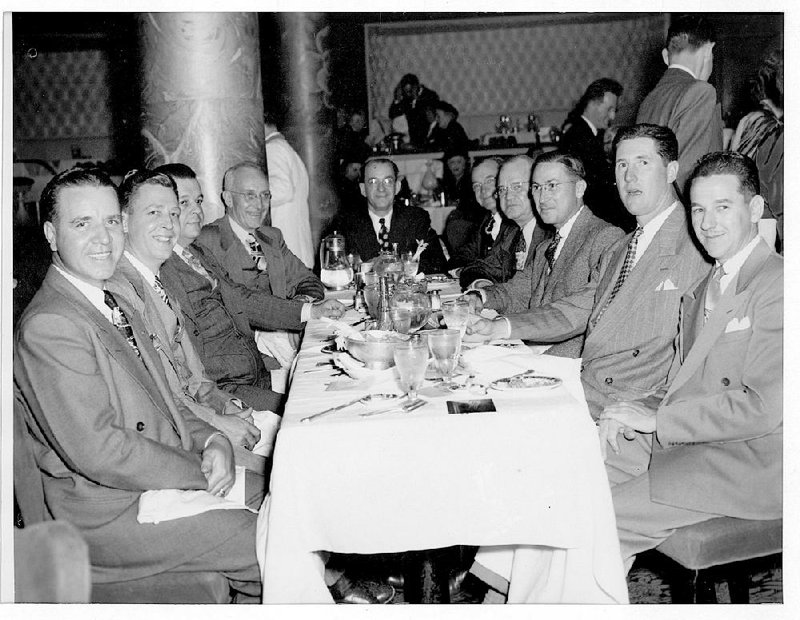It happened in one of those interlocking hallways in the maze that connects a parking garage with a downtown office building here in Little Rock--one of those in-between spaces where nothing is supposed to happen. You're on your way from one point to another. You're not really there except physically. Your mind is already ahead of yourself, or back at your last stop. In short, you're In Transit.
That's when a neat, pleasant-looking gentleman stopped me and wanted to talk about New Orleans. He'd read a column of mine about the city, and we talked about where to get the best po' boys, muffulettas, and tropical fruit. ("Three fo' a dollah! Eat 'em and hollah!") We talked about how you could catch a streetcar named Desire, take a ride to Elysian Fields, walk over to Clio and the other muses, and how the West Bank can wind up due East of the city, why the cemeteries are full of life and the past closer than the present down there, and how the N'awlins accent resembles the Brooklyn one for mysterious reasons, and how soon we could each get back to New Orleens, Land of Dreams and all that jazz . . . .
But I sensed he wanted to talk about more than that. I realized he wanted to tell me a story. I was due upstairs for a business lunch, but lunch could wait; business certainly could. Stories are how we make sense of our lives.
The story was about his father. He told me the hardest thing his father ever did was raise his hand in the back of his eighth-grade classroom in New Orleans when, at the end of the school year, the teacher asked who wouldn't be back for the ninth grade.
A lifetime later, Dan H. Bartell would remember that moment, and tell his son about it when he was dying at the old Memorial Hospital in North Little Rock.
"My dad," the son was telling me, "had two little brothers and his mother to help take care of, and had to help make ends meet." His widowed mother had worked at the paper sack company since she was 12, and, when not working there, took in washing.
As the eldest son, Dan Bartell had little choice but to leave school after the eighth grade and start looking for work. Two brothers who ran a dental supply company--they could have walked out of a Walker Percy novel, with their straw hats and wrinkled linen suits--told him they'd buy him a bicycle and he could be their delivery boy.
It was a deal, and one he never regretted. He never forgot those brothers, or they him. He started delivering dentures and dental supplies (you really learn a city when you bicycle around it), and learned the trade, then the craft of dental technician. Then the business.
Forty-seven years later, after stints in New Orleans and Shreveport and finally Little Rock, he was the head of a tri-state company. But he would yearn for a formal education the rest of his life, and study on his own when he could.
So when he retired, he didn't retire. He studied instead. Just as he had most nights and weekends all his life. He took it into his head to become a stockbroker. It wasn't easy. He took the broker's exam once, twice, three times before he finally passed--to the delight and laughter of his many friends. And then he proceeded to have another successful career.
The man talking to me bore his father's name with more than pride--with a kind of responsibility. Sons will know what I mean. "My dad," he was saying, "taught me persistence, loyalty, honesty, living with your mistakes, good will to others, service. . . ."
I especially liked the part about living with the mistakes you've made.
I was grateful to this stranger for telling me his father's story. He wasn't a stranger any more. Stories are how we make sense of our lives.
Maybe that's why God talks to us in narratives, parables, chronicles, and even family stories if we'll just pay attention. I can't remember what happened at that lunch I was headed for. I don't think I'll ever forget the son's story about his father.
Father's Day is a generic holiday, lumping all dads together in a nice, general way, the way Hallmark Cards do. But each is different. Each has a different story. And sons will tell them years later, in a hallway, to somebody they don't know but who might understand.
Fortunate sons are all alike; we wonder if we could have gone through what our fathers did, meet the tests they did, and make as good fathers as they did. We wonder about all that. We think back and go over all the things they managed to do, and in the end we stop wondering and are just grateful.
I asked Dan Bartell's son if he had a picture of his father. Sure enough, it was a picture of Bartell senior--at a business lunch. In January of 1948. At the Roosevelt Hotel in New Orleans, together with the other men in their double-breasted suits, youth, and smiles. His dad is second from the left. The photo was still shiny in its cardboard folder, complete with the logo of the old hotel. The picture is dated now, and it's not dated. Fathers like Dan H. Bartell never go out of style.
Paul Greenberg, editorial page editor of the Arkansas Democrat-Gazette, has won the Pulitzer Prize for editorial writing. The original version of this column appeared on Father's Day, 2003. E-mail him at:
pgreenberg@arkansasonline.com
Editorial on 06/21/2015
